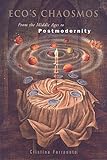Eco's Chaosmos : From the Middle Ages to Postmodernity / Cristina Farronato.
Material type: TextSeries: Toronto Italian StudiesPublisher: Toronto : University of Toronto Press, [2003]Copyright date: ©2003Description: 1 online resource (272 p.)Content type:
TextSeries: Toronto Italian StudiesPublisher: Toronto : University of Toronto Press, [2003]Copyright date: ©2003Description: 1 online resource (272 p.)Content type: - 9780802085863
- 9781442674257
- 853/.914 22
- online - DeGruyter
| Item type | Current library | Call number | URL | Status | Notes | Barcode | |
|---|---|---|---|---|---|---|---|
 eBook
eBook
|
Biblioteca "Angelicum" Pont. Univ. S.Tommaso d'Aquino Nuvola online | online - DeGruyter (Browse shelf(Opens below)) | Online access | Not for loan (Accesso limitato) | Accesso per gli utenti autorizzati / Access for authorized users | (dgr)9781442674257 |
Browsing Biblioteca "Angelicum" Pont. Univ. S.Tommaso d'Aquino shelves, Shelving location: Nuvola online Close shelf browser (Hides shelf browser)

|

|

|

|

|

|

|
||
| online - DeGruyter East Asian Capitalism : Diversity and Dynamism / | online - DeGruyter Ecological Education in Everyday Life : ALPHA 2000 / | online - DeGruyter Economics of J S Mill / | online - DeGruyter Eco's Chaosmos : From the Middle Ages to Postmodernity / | online - DeGruyter Editing Robert Grosseteste / | online - DeGruyter Editing Texts from the Age of Erasmus / | online - DeGruyter Educational Outcomes for the Canadian Workplace : New Frameworks for Policy and Research / |
restricted access online access with authorization star
http://purl.org/coar/access_right/c_16ec
While Umberto Eco's intellectual itinerary was marked by his early studies of post-Crocean aesthetics and his spectacular concentration on linguistics, information theory, structuralism, semiotics, cognitive science, and media studies, what constitutes the peculiarity of his critical and fiction writing is the tension between a typically medieval search for a code and the hermeneutic representative of deconstructive tendencies. This tension between cosmos and chaos, order and disorder, is reflected in the word chaosmos.In this brilliant assessment of the philosophical basis of Eco's critical and fictional writing, Cristina Farronato explores the other distinctive aspect of Eco's thought ? the struggle for a composition of opposites, the outcome deriving from his ability to elicit similar contrasts from the past and re-play them in modern terms. Focusing principally on how Eco's scholarly background influenced his study of semiotics, Farronato analyzes The Name of the Rose in relation to William of Ockham's epistemology, C.S. Peirce's work on abduction, and Wittgenstein's theory of language. She discusses Foucault's Pendulum as an explicit comment on the modern debate on interpretation through a direct reference to Early Modern hermetic thought, correlates The Island of the Day Before as a postmodern mixture of science and superstition, and reviews Baudolino as an historical/fantastic novel that once again situates the Middle Ages in a postmodern context. Eco's Chaosmos demonstrates how Eco's use of semiotic theory is important for an understanding of the postmodern aspects of today's literature and culture.
Mode of access: Internet via World Wide Web.
In English.
Description based on online resource; title from PDF title page (publisher's Web site, viewed 01. Nov 2023)


